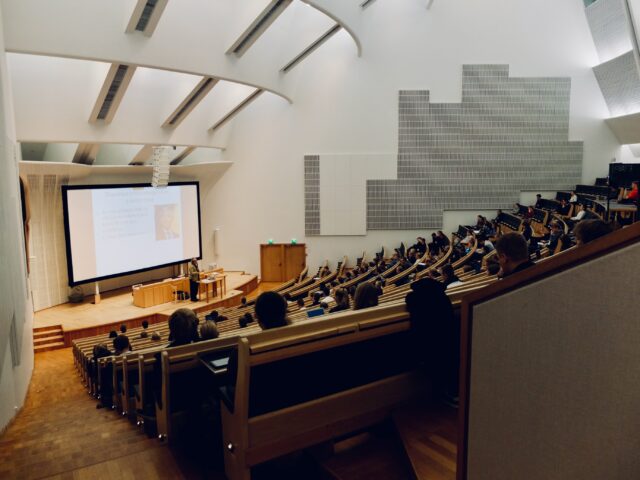The Government of Canada Minister of Immigration, Refugees and Citizenship (IRCC) Sean Fraser issued a statement about the next steps for the case of fraudulent letters of admission. Fraser explained that each case will be reviewed and every affected student that is subject to a removal order will have the opportunity to demonstrate whether they knew about the fraudulent scheme. “I want to make it clear that international students who are not found to be involved in fraud will not face deportation,” stated Fraser, who added that international students who “came to Canada with a genuine intent to study” will receive a Temporary Resident Permit. Fraser indicated that the government is focused on identifying those responsible for the fraudulent activity and on working with Designated Learning Institutions to “crack down on” dishonest consultants.

Top Ten News
June 15, 2023
The University of Manitoba’s Asper School of Business will launch an updated Bachelor of Commerce (BComm) curriculum this fall. The curriculum aims to provide students with a modernized, well-rounded degree, steeped in increased flexibility for students to explore their specialized interests. New core courses include Indigenous Peoples and Canadian Business, Sustainable Business, and an Introduction to Business Analytics. UManitoba Instructor Katherine Davis said that learning about Indigenous business is vital to further reconciliation. “Business schools have a responsibility to prepare students with the knowledge, understanding and skills to lead and advance reconciliation and improve relationships between Indigenous and non-Indigenous peoples,” said Davis.
The Canada Christian College v. Post Secondary Education et al case went before the Court of Appeal for Ontario this week. Canadian Constitution Foundation (CCF) was granted intervenor status in the case and litigation director Christine Van Geyn has penned an editorial for Policy Options explaining CCF’s perspective on the legal and constitutional context and implications of the appeal. Van Geyn asserts CCF’s position that the government cannot refuse to implement legislation that it has already passed. “While the political theatre around the case creates a spectacle, it is actually in such cases where executive overreach is most likely to occur and be tolerated,” concludes Van Geyn. “That does not make the overreach right or legal.”
In a recent article for eCampusNews, Kevin Craig argues that engineering education must evolve to meet the needs of today’s system complexity. Craig argues that even engineers with multidisciplinary engineering breadth are not currently equipped to manage system complexity and related, unique challenges. In order to prevent catastrophic failures, Craig writes that engineers should be trained with a balance between theory and practice and a skillset that includes both technological knowledge and non-technical breadth. Craig recommends that engineering students be trained as T2 engineers who have both the engineering and non-technical breadth necessary to address multidisciplinary problems.
The Teaching Support Staff Union at Simon Fraser University recently indicated its intent to take job action after unsuccessful talks at the bargaining table. The Tyee states that a TSSU member gave the union’s strike notice directly to SFU President Joy Johnson while crossing the stage at convocation on Friday. A group of other members then reportedly blew a horn, unveiled a banner over the school’s concrete convocation mall, and chanted “strike now.” TSSU told The Tyee that it is seeking improvements such as increased pay and enrolment in the university pension plan for long-term members. SFU issued a statement on the strike notice, indicating that the university bargaining team had tabled the maximum allowable monetary package under the BC PSEC mandate.
The University of New Brunswick, Atomic Energy of Canada Limited (AECL), and Canadian Nuclear Laboratories (CNL) have signed a memorandum of understanding (MOU).. Under this agreement, the existing partnership will expand into domains such as cybersecurity, hydrogen, medical isotopes, and small modular reactors. It will also create an opportunity for discussions on teaching, learning, and professional development opportunities for UNB students and AECL and CNL personnel. “This MOU will open even broader dialogues and opportunities for researchers at UNB to play an active role in Canada’s energy landscape,” said UNB VP (Research) Dr David MaGee.
Mohawk College will suspend its first-year journalism program in response to dropping enrolment and a bleak job market. The Spectator reports that the college will review the program and decide by next spring whether to revamp and resume the program. “We will work with industry partners in the field to realign the curriculum and program structure to provide students with the skillsets they need to succeed in this important and challenging field,” said Mohawk senior media relations and communications adviser Bill Steinburg. Upper year students will be able to complete their program and no faculty jobs will be affected.
Saskatchewan’s provincial auditor Tara Clemett has made recommendations to Saskatchewan Polytechnic regarding its Indigenous student enrolment and identity verification practices. Global News reports that SaskPolytech’s Indigenous student enrolment decreased by almost 30% between 2019 and 2021. Clemett noted that SaskPolytech did not complete the necessary investigations when enrolment numbers fluctuated. She issued recommendations that included expanding performance measure targets and conducting ongoing Indigenous community engagement and consultation. The auditor general also advised that the polytechnic should work to proactively protect itself from Indigenous identity fraud. SaskPolytech President Dr Larry Rosia said the school is working on a verification process and will build policies and a plan to implement the auditor’s recommendations.
In a recent editorial for The evoLLLution, Michelle Aarons (York University) discusses how continuing education programs can better serve international students. Aarons argues that continuing education models should take a more holistic approach to their students’ experience by considering their needs inside and outside of the classroom. For international students, this may involve providing access to English language services, providing a warm welcome during orientation, ensuring students are comfortable in their new accommodations, celebrating their graduation, and offering continued Alumni resources. “While students sign up for the education that will lead to the dream, they are also looking for the experience,” she concludes. “That experience and support is in the institution’s hands.”
Montreal’s public health department has launched an investigation after dozens of people fell ill during and after a computer science conference held at McGill University last week. McGill Assistant Professor and conference co-organizer David Meger told La Presse that some conference participants went to the emergency room due to the illness. Since the cause of the sickness is unknown, Meger asked conference participants to take precautions in case the virus is transmissible. Montréal’s food inspection agency is also reportedly looking into the issue; food service managers for the conference were notified, but that they were “certain” the problem did not originate with the food.
